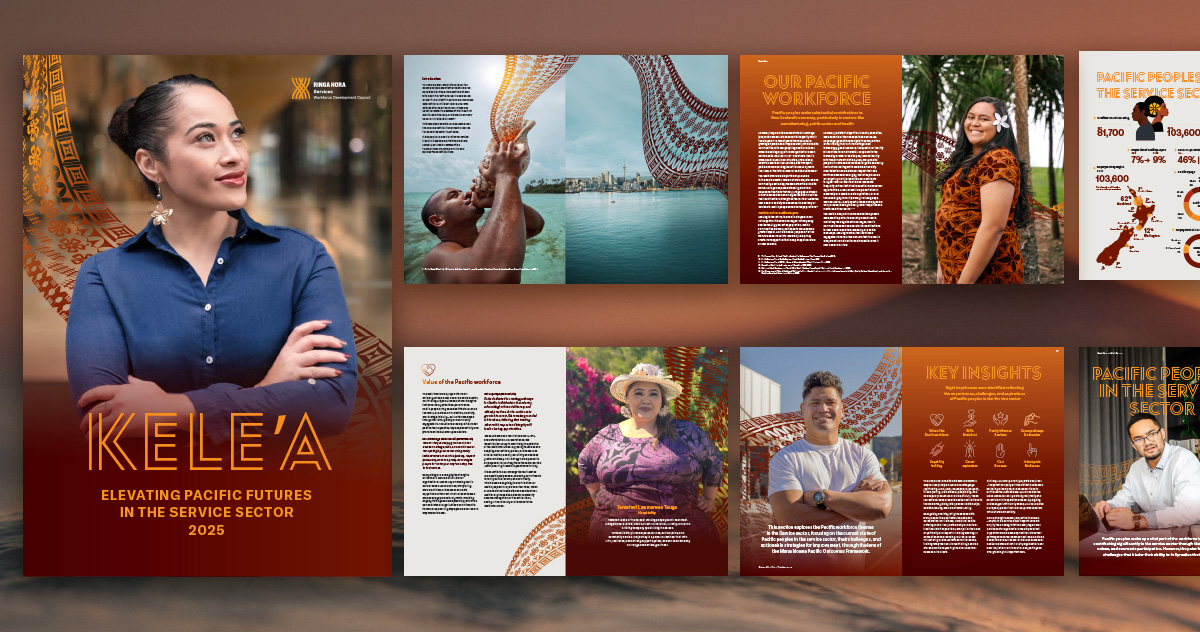
A greater focus on cultural strengths can help unlock the potential of the Pacific population in the Service sector, a new report has found.
Ringa Hora Services Workforce Development Council is pleased to announce the release of Kele’a, a deep dive into the impact, challenges, and potential of Pacific people in the Service sector.
Key data published in Kele’a shows that 103,600 Pacific people were employed in the Service sector in 2022, or about 9 percent of the Service sector workforce. They are particularly strongly represented in Contact Centres (19% of the workforce), Cleaning (15%), and Security & Government (22%).
However, Pacific people are underrepresented in leadership and governance roles within the sector, and finding ways to ensure the potential of Pacific people is not wasted is an important focus of Kele’a.
Given the numbers, it’s clear that everyone in the economy will benefit if the full potential of Pacific people in business and employment is met.
One of the major principles Kele’a highlights is the importance of concentrating on how the cultural strengths of Pacific people can boost Service businesses, rather than looking too much at areas of deficit.
“Pacific people consider their inherent abilities and attributes to be valuable organisational assets,” the report says.
“Emphasis on the ability to translate Pacific attributes like humour, teamwork, creativity, strategic thinking, communication, storytelling and collectivism is key to the future of the workforce flourishing.”
Kele’a also notes the importance to Pacific people of family, community, and culture. When Pacific people feel the importance of these are recognised in the workplace, self-confidence grows and loyalty is greatly increased.
Among the highlights of the report are snippets of the stories of several successful Pacific people in the Service sector.
“The future of the workforce is Pacific. Our young people are entering the Service sector with creativity, resilience, and a deep sense of purpose rooted in culture and community,” Pacific Growth chair Fainu’ulelei Aifa’i Esera said.
“Kele’a gives us a blueprint to ensure they are not just part of the workforce, but shaping it. If we invest in culturally grounded career pathways and leadership development now, we’ll see generational growth that benefits not just our people, but all of Aotearoa.”
Kele’a concludes with calls to action for the Service sector in eight important areas: recognising the value of the Pacific workforce, building skills, strengthening family and cultural connections, expanding career pathways and education access, supporting business growth, empowering career and leadership development, addressing cost and access barriers, and enhancing industry collaboration.
It also asks questions about the road ahead for the Pacific workforce for employers, educators, and the Pacific community. Employers are asked to consider how the recognition of Pacific values can help their staff and business. Educators are asked how their programmes can meet Pacific career aspirations and remove any barriers to success, while the Pacific community is asked what cultural strengths should be emphasised more in workplace settings.
The insights in the report can help Service businesses become more successful through the fostering of Pacific employees and businesses. It provides a path for success for Pacific people and for New Zealand as a whole.
Download and read the full Kele’a report on the Ringa Hora website.
